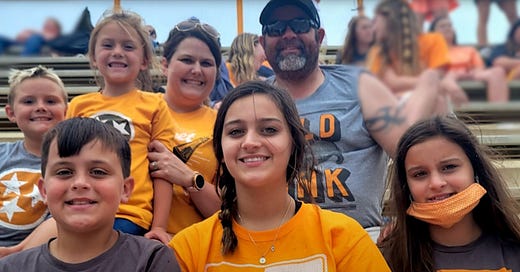Brittnee's Triumph Over Postpartum Complications with ECMO Support
Key Points:
Brittnee's post-childbirth flu progressed to severe pneumonia and sepsis, leading to lung collapse.
She underwent 70 days of ECMO therapy at UT Medical Center, facing significant challenges.
With ECMO support and a dedicated medical team, Brittnee achieved a remarkable recovery.
Thanks for reading ECMO 143: A Patient & Family Guide. You can subscribe for free to receive new posts and support my work.
Introduction
Extracorporeal Membrane Oxygenation (ECMO) is a life-saving technique used to support patients with severe cardiac and respiratory failure. By temporarily taking over the functions of the heart and lungs, ECMO allows these vital organs time to rest and heal. This advanced therapy has been pivotal in the recovery of many patients, including Brittnee, whose story exemplifies resilience and the critical role of ECMO in modern medicine.
Brittnee's Health Crisis
In late 2022, shortly after giving birth to her third child, Brayden, Brittnee began experiencing flu-like symptoms. Despite initial assumptions of a mild illness, her condition rapidly deteriorated. The flu progressed into bacterial and viral pneumonia, severely compromising her respiratory system. Within two weeks, Brittnee developed sepsis—a life-threatening response to infection—and suffered lung collapse. Recognizing the severity of her condition, medical professionals airlifted her to the University of Tennessee Medical Center in December 2022.
Initiation of ECMO Therapy
Upon arrival, Brittnee's medical team determined that conventional treatments were insufficient. They decided to initiate ECMO therapy, a decision often reserved for patients with severe, reversible cardiac or pulmonary failure unresponsive to standard interventions. ECMO involves circulating blood outside the body through an artificial lung, oxygenating it, and returning it to the patient's bloodstream. This process allows the heart and lungs to rest and recover.
Challenges During Treatment
Brittnee's journey on ECMO was fraught with complications. One of her lungs detached from the chest wall, leading to internal bleeding. She required surgery to address this issue, and her medical team faced the delicate balance of managing bleeding risks while ensuring adequate anticoagulation—a common challenge in ECMO management. Despite these hurdles, the medical team's expertise and Brittnee's resilience played crucial roles in her recovery.
The Road to Recovery
After 70 days on ECMO, Brittnee was gradually weaned off the machine in March 2023. Transitioning from ECMO support was both a physical and psychological challenge. Brittnee expressed anxiety about relying on her lungs again, highlighting the importance of comprehensive rehabilitation that addresses both physical recovery and mental health. Her journey underscores the need for multidisciplinary support systems in critical care settings.
The Role of ECMO in Postpartum Complications
Brittnee's case is a testament to the potential of ECMO in treating severe postpartum complications. While ECMO carries risks, including bleeding and infection, its use in life-threatening situations like Brittnee's has shown promising outcomes. Studies have indicated that ECMO can be a feasible salvage therapy for pregnant and postpartum women with reversible cardiac or respiratory failure.
Conclusion
Brittnee's story is about courage, resilience, and the life-saving potential of advanced medical interventions like ECMO. Her experience highlights the importance of recognizing severe postpartum complications early and the need for specialized treatments. It also emphasizes the critical role of a dedicated medical team in navigating the complexities of ECMO therapy. For patients and families facing similar health crises, Brittnee's journey offers hope and underscores the advancements in medical technology that can lead to recovery even in the most dire circumstances.
For a deeper insight into Brittnee's experience, watch her story shared by UT Medical Center:
Thanks for reading ECMO 143: A Patient & Family Guide! Subscribe for free to receive new posts and support my work.




